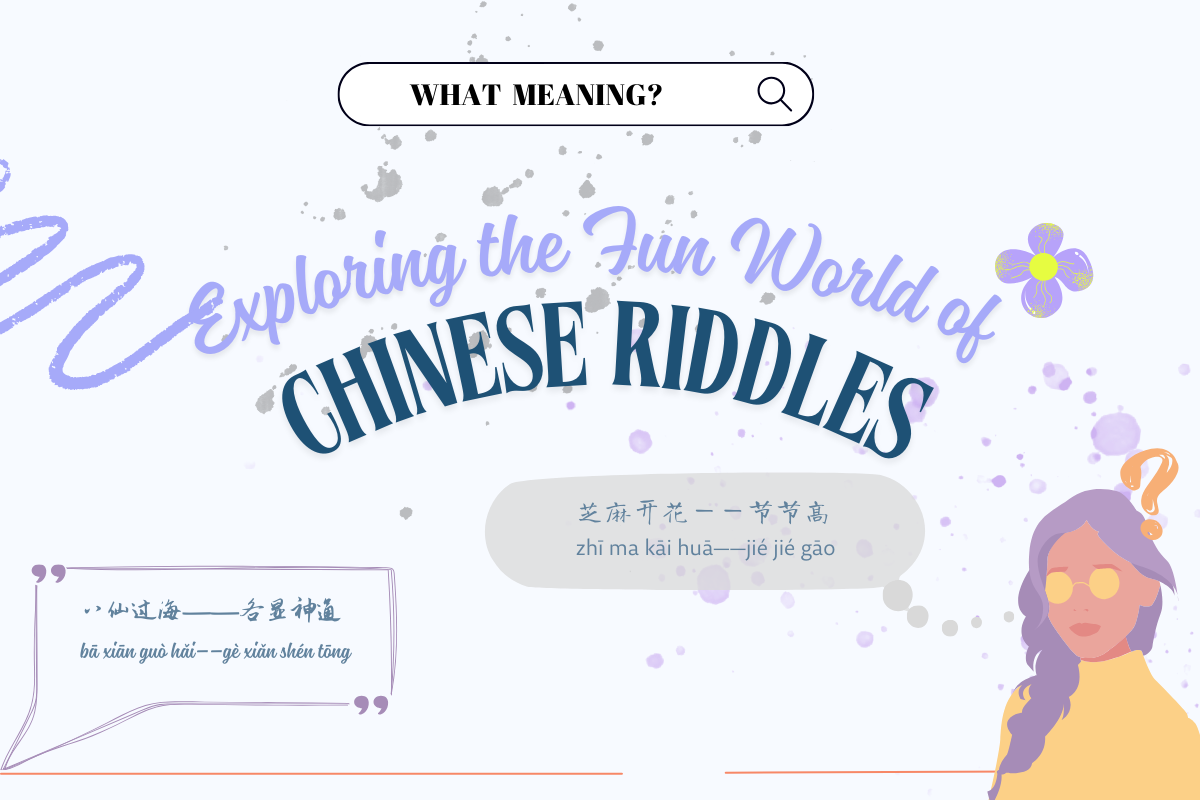Exploring the Fun World of Chinese Riddles
In the magical world of the Chinese language, Chinese riddles shine like bright pearls, vividly showcasing folk wisdom through their unique expressions and rich cultural meanings. Today, let's dive into the delightful realm of Chinese riddles and appreciate their unique charm together.

八仙过海——各显神通(bā xiān guò hǎi——gè xiǎn shén tōng)
Eight Immortals Crossing the Sea — Each Displays Their Skills: This saying means everyone has their own way of doing things, or it can also describe people showcasing their talents in a competition.
泥菩萨过江——自身难保(ní pú sà guò jiāng——zì shēn nán bǎo)
A Mud Bodhisattva Crossing the River — Unable to Protect Oneself: This phrase describes someone who can't even protect themselves, let alone help others.
孔夫子搬家——净是输(书)(kǒng fū zǐ bān jiā——jìng shì shū)
Confucius Moving House — Always Losing (Books): The pun on "book" and "lose" is often used to describe constantly failing in competitions or contests.
打破砂锅——问到底(dǎ pò shā guō——wèn dào dǐ)
Breaking a Terra-cotta Pot — Asking Until the Bottom: This expression signifies persistently asking for the truth or reasons about something until it is fully understood, never giving up until the purpose is achieved.
猫哭耗子——假慈悲(māo kū hào zi——jiǎ cí bēi)
A Cat Crying Over a Dead Mouse — Fake Compassion: This phrase refers to pretending to show sympathy or pity, but not genuinely caring inside.
外甥打灯笼——照旧(舅)(wài shēng dǎ dēng long——zhào jiù)
A Nephew Holding a Lantern — Same as Before (Uncle): The pun on "uncle" and "same" means everything remains unchanged, just like before.
丈二和尚——摸不着头脑(zhàng èr hé shang——mō bù zhe tóu nǎo)
A Two Zhang Buddhist Monk — Unable to Grasp the Point: This phrase indicates being unable to understand what is going on, leaving one feeling confused.
老鼠过街——人人喊打(lǎo shǔ guò jiē——rén rén hǎn dǎ)
A Mouse Crossing the Street — Everyone Shouting and Beating: This metaphorically describes bad people or bad deeds being condemned and opposed by everyone.
芝麻开花——节节高(zhī ma kāi huā——jié jié gāo)
Sesame Blossoming — Getting Better and Better: This expression portrays life, career, etc., constantly progressing in a positive direction, improving continuously.
骑驴看唱本——走着瞧(qí lǘ kàn chàng běn——zǒu zhe qiáo)
Riding a Donkey and Watching a Singing Opera — Wait and See: It means waiting for some time before drawing conclusions, as the outcome of a situation is uncertain.
These Chinese riddles are treasures of folk culture, originating from life and vividly reflecting life, conveying wisdom, emotions, and teachings in an easy-to-understand manner. May you come across even more intriguing Chinese riddles in your future endeavors!